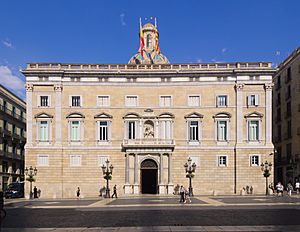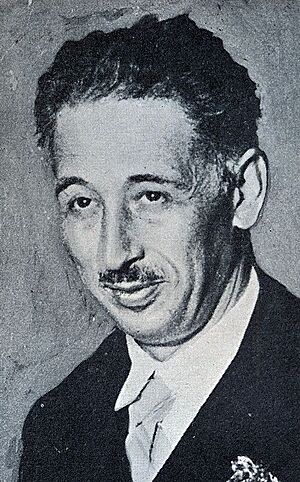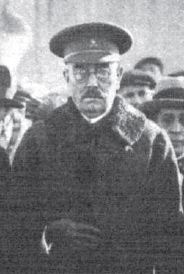Events of 6 October facts for kids
Quick facts for kids Events of 6 October |
|||||||
|---|---|---|---|---|---|---|---|
| Part of the Revolution of 1934 | |||||||
 Palau de la Generalitat de Catalunya |
|||||||
|
|||||||
| Belligerents | |||||||
| Commanders and leaders | |||||||
| Lluís Companys Josep Dencàs |
Alejandro Lerroux Domènec Batet |
||||||
| Casualties and losses | |||||||
| 74 dead, 252 wounded | |||||||
The events of 6 October (also known as Fets del sis d'octubre in Catalan) were a series of important happenings in Catalonia, Spain, on October 6, 1934. On this day, Catalonia's government declared itself a "Catalan State." This happened during a big strike and armed uprising across Spain, called the Revolution of 1934.
The President of Catalonia, Lluís Companys, made the declaration because he was unhappy that conservative politicians were joining the Spanish government. Soon after, fighting broke out. Spanish military forces attacked the Palau de la Generalitat de Catalunya (the main government building in Catalonia). Companys surrendered the next morning, on October 7.
Contents
What Led to the Events?
Changes in Spain's Government
In the Spanish election of 1933, political parties that were considered "left-wing" (who often wanted more social change) lost many votes. A new conservative party, the CEDA, became the largest party. Conservatives usually prefer to keep things more traditional.
Even though CEDA won the most seats, the new prime minister, Alejandro Lerroux, formed a government without them. His party, the Radical Republican Party, was in charge. But Lerroux later resigned, and another prime minister took over.
During the summer of 1934, there were many strikes and social problems. Because of this, CEDA stopped supporting the government and demanded to be part of it. The President of Spain then asked Lerroux to form a new government.
On October 4, 1934, the new government was announced. It included three members from the CEDA party. Many left-wing groups felt this was a "betrayal" of the Spanish Republic. The UGT, a large workers' union, called for a general strike.
Strikes Across Spain
The general strike began on October 5 in many cities across Spain. These included Madrid, Seville, and Zaragoza. There was fighting in some areas, like the Basque Country.
In Madrid, there were also clashes, but the planned uprisings mostly failed. The military and police (Guardia Civil) did not join the rebels as hoped. Outside of Catalonia, the biggest fighting happened in Asturias. There, activists took control of several towns, starting the Asturian miners' strike of 1934. This was part of the larger "October Revolution."
Catalonia's Desire for Self-Rule
After the Second Spanish Republic was formed in 1931, Catalonia gained some self-rule. This was through a special law called the Statute of Autonomy. This law made Catalonia an "autonomous region," meaning it could make some of its own decisions. However, the Spanish government still controlled important things like taxes and education.
In November 1932, elections were held for a new Catalan parliament. The ERC party won, and Francesc Macià became president.
When Adolf Hitler became leader in Germany in 1933, it worried many people. In Catalonia, a group called the Workers' Alliance was formed. This group was against fascism (a type of strict, controlling government). They wanted to prepare for a revolution to create a federal Spanish republic, where different regions had more power.
President Macià died at the end of 1933. Lluís Companys was elected as the new president of Catalonia in January 1934. His party, the ERC, won the Catalan election that year. This was different from the rest of Spain, where conservative parties were gaining power. The ERC and many Catalans worried that the CEDA party's success in Spain would threaten Catalonia's self-rule.
The Day of the Events: October 6th
In Catalonia, the Workers' Alliance organized the general strike. They worked with the Escamots, who were like a special group connected to the ERC party. The Catalan security minister, Josep Dencàs, thought he had many armed Escamots ready. But they were not well-prepared for the actual fighting.
President Lluís Companys was thought to be talking with Manuel Azaña, a former Spanish prime minister. The idea was to declare the Spanish government removed and create a new temporary government in Barcelona. However, Azaña met with his own party members and decided against such an action. He then left his hotel to stay with a friend.
Companys called Domènec Batet, the military commander in Barcelona. He asked Batet to support the new Catalan republic. Batet did not give a clear answer.
At 8 p.m., Companys appeared on a balcony of the Palau de la Generalitat (the Government Building). He announced the "Catalan State within the Spanish Federal Republic." He told the crowd that "monarchists and fascists" had "attacked the government." He said that his government was taking all power in Catalonia. He invited other groups protesting against fascism to set up a temporary government in Catalonia. He promised that the Catalan people would help create a "liberal and magnificent federal republic."
About an hour later, General Batet declared martial law. This meant the military took control. He quickly moved against union offices and militia headquarters, and they surrendered. Then, he used light artillery against the city hall and the Generalitat building. The fighting continued until 6 a.m. the next morning, when President Companys surrendered.
What Happened Next?
Companys and his government were arrested. Manuel Azaña was also arrested, even though he had not taken part in the events. He was released in December.
On December 14, Catalonia's Statute of Autonomy was stopped indefinitely. All the powers that had been given to Barcelona were returned to the central government in Madrid. In June 1935, Companys was sentenced to thirty years in prison.
However, after the Spanish general election of 1936, a new government was formed by Manuel Azaña. This new government released Companys and his team from jail.
See also
 In Spanish: Proclamación del Estado Catalán de 1934 para niños
In Spanish: Proclamación del Estado Catalán de 1934 para niños
 | Valerie Thomas |
 | Frederick McKinley Jones |
 | George Edward Alcorn Jr. |
 | Thomas Mensah |



